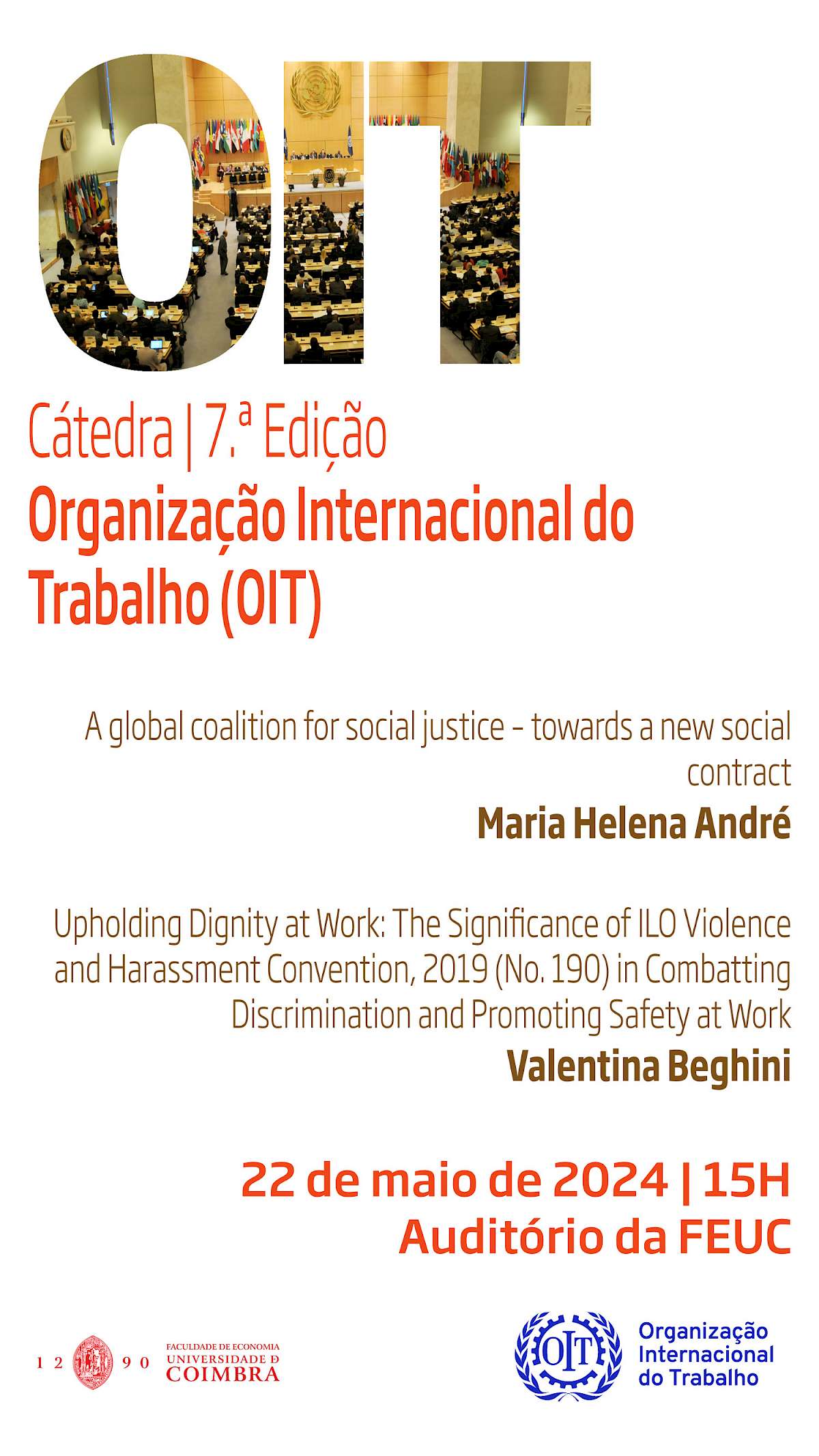Cátedra | 7.ª Edição Organização Internacional do Trabalho (OIT)

Speaker
Maria Helena André
Title
A global coalition for social justice – towards a new social contract
Abstract:
We live in a world characterised by uncertainty, multiple crises, growing conflicts around the world, the resulting economic shocks, and the economic ramifications of the Covid-19 outbreak. The accelerating changes our societies are facing, resulting from the long standing “megatrends” such as globalisation, new technologies and the digital transformation, the challenge of climate change, alongside with the growth of inequalities and extreme poverty, show that the social contract model inherited from the post-Second World War has become obsolete. There is an urgent need for a new social contract to regulate the rights and duties between States and their citizens more effectively.
The United Nations Secretary-General, Antonio Guterres, recalled that: “The New Social Contract, between Government, people, civil society, business and more, must integrate employment, sustainable development and social protection, based on equal rights and opportunities for all”.
The ILO Director General, Gilbert Houngbo, said in his vision statement (2022) that: Progress made in last decades in terms of social justice must be preserved and protected, while the global solutions to new challenges and opportunities must be centred around human, environmental, economic and societal values. In short, a new global social contract is required.”
The presentation will focus on what could be the components of the new social contract, that needs to be inclusive and flexible, promoting social justice and decent work for all; on how governments, employers and workers organisations can engage in the design and establishment of a new social contract within the multilateral system and at national level.
Biographical note:
Maria Helena André is the Director of ILO Bureau for Workers’ Activities since 2013. She has a long career in European Trade Union Movement, where she was Deputy General Secretary, in charge of the European Social Dialogue and the negotiations with European Employers Organisations, she was Minister of Labour and Social Solidarity in Portugal and Member of Parliament.
Speaker
Valentina Beghini
Title of the session:
Upholding Dignity at Work: The Significance of ILO Violence and Harassment Convention, 2019 (No. 190) in Combatting Discrimination and Promoting Safety at Work
Abstract:
Violence and harassment at work is a widespread phenomenon around the world, with more than one in five persons in employment having experienced at least one form of violence and harassment (be it physical, psychological or sexual) at work during their working life. The risk of experiencing violence and harassment at work is particularly more pronounced across demographic groups such as youth, migrant and wage and salaried women, and for persons who have experienced discrimination on the basis of gender, disability status, nationality/ethnicity, skin colour and/or religion (ILO, 2022). Challenges to the elimination of violence and harassment in the world of work are numerous. They include hazy notions of what types of behaviour constitute violence and harassment, a public discourse that tends either to remain silent on or normalize violence and harassment, taboos that discourage victims from speaking up, and normative instruments, mechanisms, and public institutions that often fail to ensure effective prevention mechanisms, access to justice and remedial services for all forms of violence and harassment.
In 2019, the global community has made it clear that violence and harassment in the world of work will not be tolerated and must end. On June 21, 2019, the ILO’s International Labour Conference adopted the Centenary Declaration on the Future of Work, expressing a clear commitment to a world of work free from violence and harassment. On the same day, the Centenary Conference brought this commitment to life with the adoption of the Violence and Harassment Convention (No. 190) and Recommendation (No. 206). Since then, thirty-nine countries have ratified such Convention.
The presentation will delve into the pivotal role of Convention No. 190 and Recommendation No. 206 in safeguarding the dignity and safety of individuals at work and its ground-breaking features and implications in promoting a more equal and safer world of work for all. Through an analysis of the Convention’s key provisions and its potential impact on labour practices, the presentation will underscore the importance of Convention No. 190 as roadmap for progress, promising a future where every individual is treated with dignity, respect and equality at work. Moreover, it will explore the challenges and opportunities in the implementation of Convention No. 190, emphasizing the imperative of social dialogue to realize its transformative potential.
Biographical note:
Valentina Beghini is a lawyer, with a Ph.D. on European and Comparative Legal Studies and over 15 years working experience at the national and international level – including with Governmental Agencies, UN, NGOs and private sector in Europe, Southeast Asia and sub-Saharan Africa. She has worked extensively on fundamental principles and rights at work, international labour standards, gender equality and children’s rights. She is currently working as Legal Specialist on Violence, Harassment and Non-discrimination, in the Gender Equality, Diversity and Inclusion Branch of the International Labour Organization (ILO) in Geneva, coordinating the work on the promotion of the ratification of the ILO Violence and Harassment Convention, 2019 (No. 190) and of its implementation along with its accompanying Recommendation (No. 206).
